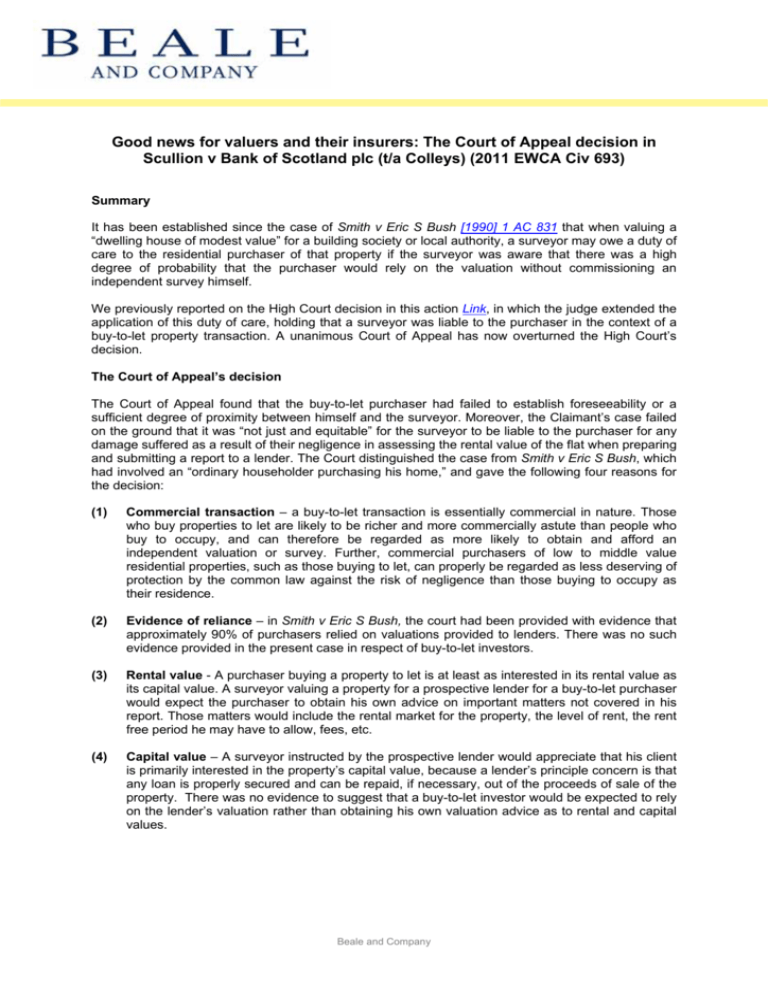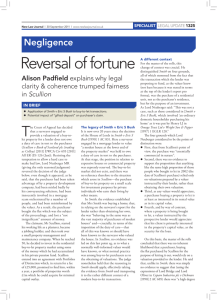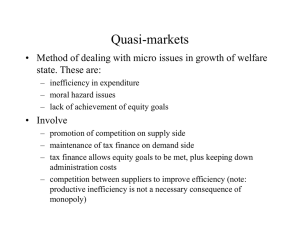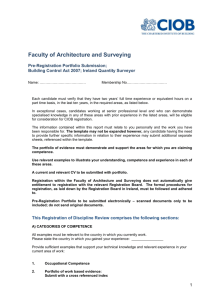publication (519.41KB PDF)
advertisement

Good news for valuers and their insurers: The Court of Appeal decision in Scullion v Bank of Scotland plc (t/a Colleys) (2011 EWCA Civ 693) Summary It has been established since the case of Smith v Eric S Bush [1990] 1 AC 831 that when valuing a “dwelling house of modest value” for a building society or local authority, a surveyor may owe a duty of care to the residential purchaser of that property if the surveyor was aware that there was a high degree of probability that the purchaser would rely on the valuation without commissioning an independent survey himself. We previously reported on the High Court decision in this action Link, in which the judge extended the application of this duty of care, holding that a surveyor was liable to the purchaser in the context of a buy-to-let property transaction. A unanimous Court of Appeal has now overturned the High Court’s decision. The Court of Appeal’s decision The Court of Appeal found that the buy-to-let purchaser had failed to establish foreseeability or a sufficient degree of proximity between himself and the surveyor. Moreover, the Claimant’s case failed on the ground that it was “not just and equitable” for the surveyor to be liable to the purchaser for any damage suffered as a result of their negligence in assessing the rental value of the flat when preparing and submitting a report to a lender. The Court distinguished the case from Smith v Eric S Bush, which had involved an “ordinary householder purchasing his home,” and gave the following four reasons for the decision: (1) Commercial transaction – a buy-to-let transaction is essentially commercial in nature. Those who buy properties to let are likely to be richer and more commercially astute than people who buy to occupy, and can therefore be regarded as more likely to obtain and afford an independent valuation or survey. Further, commercial purchasers of low to middle value residential properties, such as those buying to let, can properly be regarded as less deserving of protection by the common law against the risk of negligence than those buying to occupy as their residence. (2) Evidence of reliance – in Smith v Eric S Bush, the court had been provided with evidence that approximately 90% of purchasers relied on valuations provided to lenders. There was no such evidence provided in the present case in respect of buy-to-let investors. (3) Rental value - A purchaser buying a property to let is at least as interested in its rental value as its capital value. A surveyor valuing a property for a prospective lender for a buy-to-let purchaser would expect the purchaser to obtain his own advice on important matters not covered in his report. Those matters would include the rental market for the property, the level of rent, the rent free period he may have to allow, fees, etc. (4) Capital value – A surveyor instructed by the prospective lender would appreciate that his client is primarily interested in the property’s capital value, because a lender’s principle concern is that any loan is properly secured and can be repaid, if necessary, out of the proceeds of sale of the property. There was no evidence to suggest that a buy-to-let investor would be expected to rely on the lender’s valuation rather than obtaining his own valuation advice as to rental and capital values. Beale and Company Comment This case provides welcome news for valuers and their insurers. Despite expressions of sympathy for the Claimant the Court of Appeal have refused to extend the duty of care in mortgage valuation cases beyond the restricted class of those buying modest properties. It now appears that surveyors will not, when providing valuations to lenders, owe a duty of care in tort to buy-to-let or other commercial property purchasers. For further information please contact Paul Redfern on +44 (0117 311 7470 or p.redfern@bealelaw.com or Kristina Vongas on +44 (0)20 74208667 or k.vongas@beale-law.com. June 2011 Beale and Company







